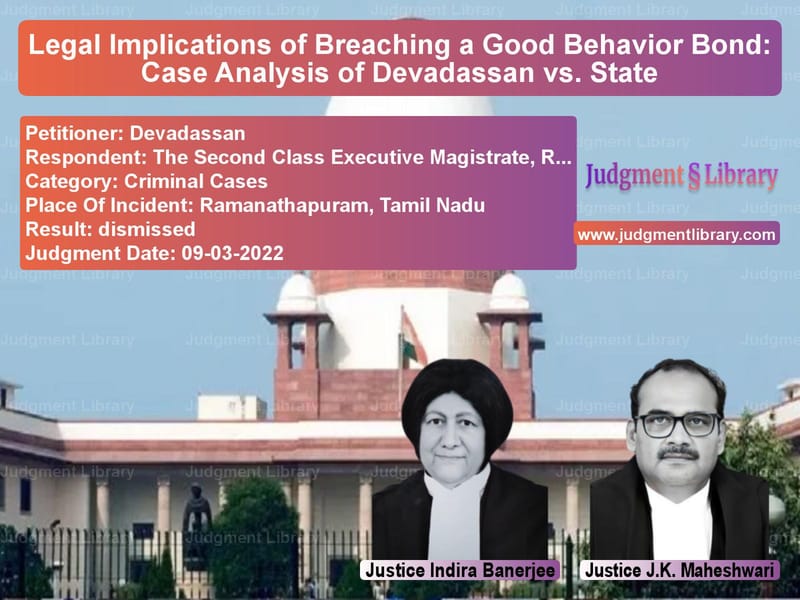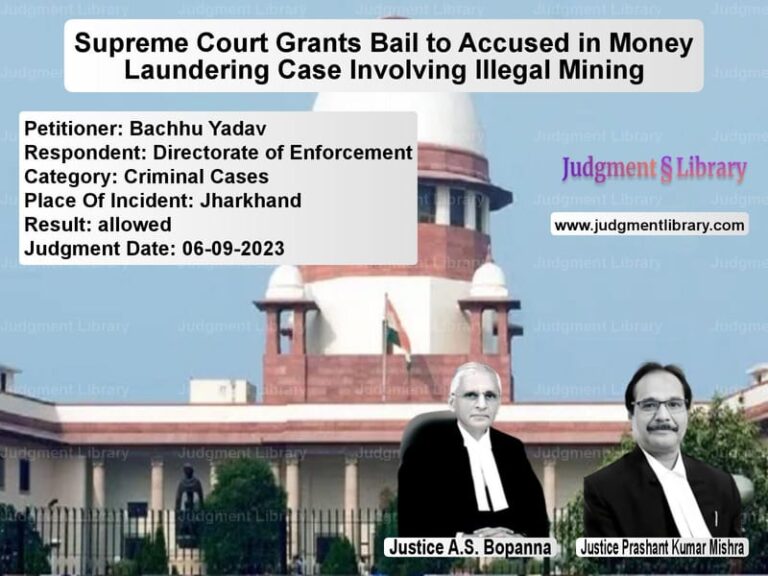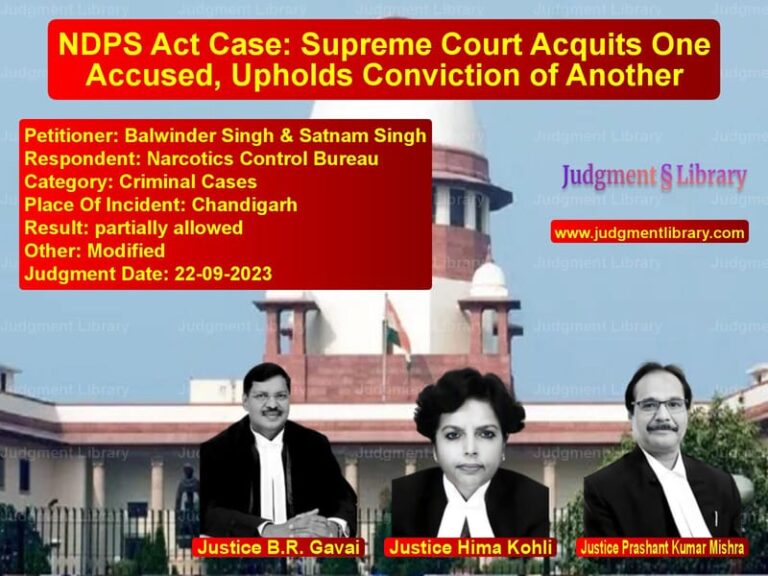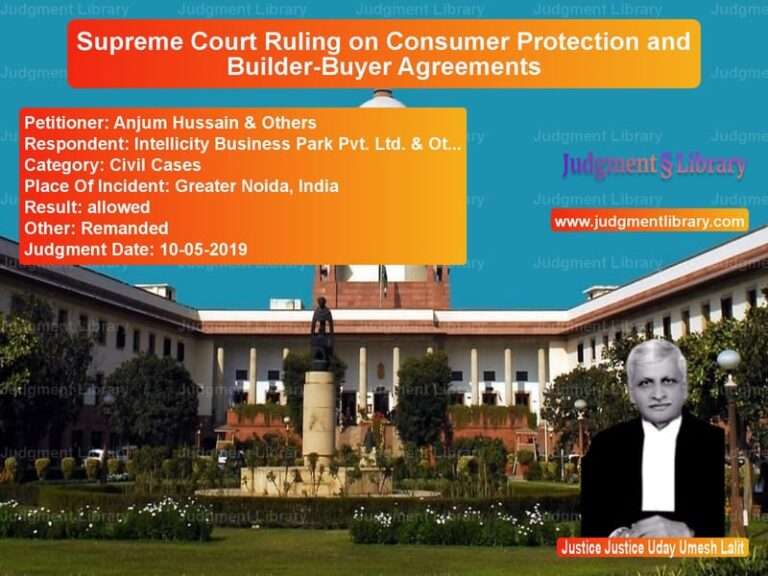Legal Implications of Breaching a Good Behavior Bond: Case Analysis of Devadassan vs. State
The case of Devadassan vs. The Second Class Executive Magistrate, Ramanathapuram & Others highlights critical legal principles regarding preventive detention, bond for good behavior, and the powers of executive magistrates under the Code of Criminal Procedure (Cr.P.C.). This case examined whether an individual bound by a good behavior bond under Section 117 Cr.P.C. could be sent to prison upon being accused in another criminal case.
Background of the Case
The appellant, Devadassan, was directed by the Second Class Executive Magistrate, Ramanathapuram, to execute a bond under Section 117 read with Section 110(e) of the Cr.P.C. for maintaining good behavior for a year. He undertook to pay Rs. 50,000/- as a penalty in case of breach.
However, after executing the bond, the appellant was accused in a murder case registered as Crime No. 149 of 2021 under Sections 147, 148, 342, 302 read with 109/120(B) of the IPC. Consequently, the Executive Magistrate found him guilty of breaching the bond and ordered his arrest under Section 122(1)(b) Cr.P.C. This decision was upheld by the Madras High Court.
The appellant challenged this decision in the Supreme Court, arguing that his arrest violated his fundamental rights and due process.
Petitioner’s Arguments
The appellant’s counsel, Shri A. Velan, presented the following arguments:
- The orders passed by the Executive Magistrate and High Court were arbitrary and did not follow the principles of natural justice.
- Executive magistrates often lack proper legal training, and their decisions should not affect personal liberty without due process.
- Relying on the Delhi High Court judgment in Aldanish vs. State of NCT of Delhi (2018 SCC Online Del 12207), he emphasized that magistrates need proper training on handling such cases.
- The appellant’s involvement in the murder case was not proven, and without a conviction, his bond should not be considered breached.
- Referring to Prem Chand vs. Union of India (1981) 1 SCC 639, he argued that the police and magistrates should not have unchecked powers that threaten personal liberty.
Respondent’s Arguments
The respondents, represented by Dr. Joseph Aristotle S., countered the arguments as follows:
- The appellant had a criminal history, with eight prior cases from 2012 to 2021, including charges of grievous hurt, theft, and violations under the Arms Act.
- The bond was executed under Section 117 Cr.P.C. to ensure he maintained peace, and violating the bond triggered action under Section 122(1)(b) Cr.P.C.
- The appellant was accused in a murder case soon after executing the bond, proving he had not adhered to the terms.
- The show cause notice and inquiry process were duly followed before his arrest, and there was no violation of due process.
Supreme Court’s Observations
The Supreme Court carefully examined whether the Executive Magistrate had followed proper legal procedures. It held:
“The bond executed by the appellant on 24.2.2021 under Section 110 read with Section 117 Cr.P.C. has been violated by him on account of his involvement in a criminal case, registered subsequently.”
The Court emphasized that Chapter VIII of the Cr.P.C. empowers executive magistrates to take preventive action for maintaining public peace. The bond for good behavior under Sections 107-110 Cr.P.C. is a preventive measure, and its breach invites legal consequences.
The Court also noted that the appellant had been given ample opportunity to present his case and that the magistrate’s decision was based on a proper inquiry.
Final Judgment
The Supreme Court dismissed the appeal and upheld the orders of the Executive Magistrate and High Court. It concluded:
- The appellant had executed the bond voluntarily, and his subsequent involvement in a criminal case constituted a breach.
- The due process of issuing a show cause notice and conducting an inquiry was followed before his arrest.
- The preventive detention under Section 122(1)(b) Cr.P.C. was justified, given the appellant’s criminal background and the need for public peace.
Key Takeaways from the Judgment
- Validity of Good Behavior Bonds: Courts have reaffirmed that individuals who execute bonds under Sections 107-110 Cr.P.C. must comply with their terms, and violations can lead to legal consequences.
- Due Process in Preventive Actions: The judgment highlights that magistrates must follow due process before ordering arrests, which was done in this case.
- Limitations on Executive Powers: While magistrates have broad powers to ensure public order, their actions must align with legal safeguards.
- Fundamental Rights vs. Public Order: The Court balanced personal liberty against the need to prevent criminal activities that disturb public peace.
Conclusion
This case sets an important precedent on how courts interpret preventive detention and good behavior bonds. While personal liberty is a fundamental right, it is not absolute. The state has the authority to impose restrictions on individuals who pose a threat to public order, provided legal procedures are followed. The Supreme Court’s ruling upholds the principle that preventive measures are crucial in maintaining law and order, particularly when dealing with habitual offenders.
Petitioner Name: Devadassan.Respondent Name: The Second Class Executive Magistrate, Ramanathapuram & Others.Judgment By: Justice Indira Banerjee, Justice J.K. Maheshwari.Place Of Incident: Ramanathapuram, Tamil Nadu.Judgment Date: 09-03-2022.
Don’t miss out on the full details! Download the complete judgment in PDF format below and gain valuable insights instantly!
Download Judgment: devadassan-vs-the-second-class-exe-supreme-court-of-india-judgment-dated-09-03-2022.pdf
Directly Download Judgment: Directly download this Judgment
See all petitions in Bail and Anticipatory Bail
See all petitions in Custodial Deaths and Police Misconduct
See all petitions in Attempt to Murder Cases
See all petitions in SC/ST Act Case
See all petitions in Theft and Robbery Cases
See all petitions in Judgment by Indira Banerjee
See all petitions in Judgment by J.K. Maheshwari
See all petitions in dismissed
See all petitions in supreme court of India judgments March 2022
See all petitions in 2022 judgments
See all posts in Criminal Cases Category
See all allowed petitions in Criminal Cases Category
See all Dismissed petitions in Criminal Cases Category
See all partially allowed petitions in Criminal Cases Category







